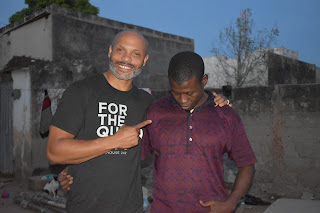Senegal Day 7, final reflections written by Michael DeVaul
We live in a world driven by speed, fascination with celebrities and more often enamored with financial wealth and material things. Technology allows us to quickly move into conversations that can lead to speaking at times before we have all the facts and judging without context.
Over 13 years ago, the YMCA’s of Senegal and Charlotte, NC agreed to form a partnership inspired by our connection of history. In many ways, this has been a reformation plan to recapture what had been dismissed 300 years ago. We are best defined by our human qualities of caring and respect for mankind and each other. In 2004 the YMCA’s had dreams of sharing best practices, a rebuilding of sorts, believing that together we could become stronger together, coast to coast.
Inspired by solid leadership, the YMCA of Senegal had five locations; today they have eleven spreading both north and south building community in every step, every hug, and every handshake. Back then they had thoughts of growing a school from preschool to sixth graders. In 2004 in the city of Dakar they had just 26 students at the Y school, today they have a strong school that hosts 426 students, a testimony to hard work and dedication to meet a community need. They are not unlike the YMCA of Greater Charlotte, we both stand committed and inspired to improve education and community health for all as we know illiteracy anywhere, leads to poverty everywhere. The above are just examples of what can happen with vision and determination.
Senegal and Charlotte share commonalities of the North Atlantic ocean, red clay dirt and a coastal heritage and history that is rooted in the generations of West Africans who still today take resident in and fill the Coastal Carolinas and Coastal Georgia. Much of the early success of the Carolinas can be traced back to the importation of transatlantic slave labor from the 16th to the 19th centuries. Lots of souls were lost on all sides as the basis of this relationship was largely transactional driven by greed and commerce.
On Saturday, November 25th, twelve YMCA of Greater Charlotte volunteer and staff team members set out on a journey to explore, exchange and embrace with enthusiasm and uncertainty to become Global Ambassadors continuing to build a bridge between a state and a country. Over the past week, we asked team members to share their story of triumph, heartbreak, jubilation and most of all self-discovery. Our Senegalese Y family has a way of embracing each team member with their own truth without judgment giving each individual just enough of a glimpse the richness in the ethnicity, religion, linguistic and cultural diversity of a welcoming people.
Yaangi Noos is a term in Wolof that means “Are you enjoying Life?” it exemplifies the fun, laid back spirit of the country. The response would be Waaw, which means yes in Wolof. Asalaamaleikum is also a phrase meaning “Peace be upon you”, spoken by many as we walk onto street or walk into buildings. By day three, I could sense a strong sense of calmness in our team as we traveled to many locations. I could feel the pause and reflection with every question, with each interaction, with every tear, with each hug or handshake. Our 2017 team, like others who have come before them, begin to shift from a U.S. centered lens of scarcity to a global lens of abundance. Moving from a sense of privilege to an appreciation of fellowship and shared accountability, moving questions of the transactional investment to inspiring transformational, systems thinking. By day seven, they have evolved to equity leaders, bonding through new friends and family and with each other. This is at the heart of our global service-learning program; to produce leaders to can see beyond their borders, their home community broadening and strengthening community globally, locally.
Our YMCA internationally celebrates Y Leader John Raleigh Mott who won the Nobel Peace Prize in 1946. He was known as an international leader who sought to advance understanding and reconciliation. He organized youth exchanges, set up study groups, and arranged international youth camps. He criticized the oppression of colonial peoples and was a pioneer in the struggle against racial discrimination. In his acceptance speech he suggests, “In this world-wide effort I have concentrated on successive generations of youth. If I were to add a word it would be a word of abounding hope.” John R. Mott traveled to 83 countries, often times more than once, working to inspire young people to embrace and to testify, “that WE will all be ONE”. He dedicated his life to developing global leaders, global ambassadors.
With each trip we build upon his vision to multiply the mission with people, that’s how we rinse challenge to become opportunity converting ourselves to believe it is not about our wealth but how we invest in each other. Investment leads people to become rich in discovery, curiosity and one other. When we invest in people, they invest in each other, in their neighbors and community.
Congratulations to Scierra, Symone, Xzabia, Courtney, Dena, Jordan, Toussaint and Heather, Todd, Denise and Elle for the completion of the trip and for sharing your stories transparently. As I challenge each of our global ambassadors every year, find yourself in the world and take a moment to ask yourselves “what would John R. Mott do?” You are soldiers for social good in a worldwide Movement that is hungry to reap a harvest of your learning’s both in Charlotte and in Senegal.Thank you to Jean, Diacounda, Malik, Alphonse, Adriane and so many others who made our journey a special one. The Senegalese team taught us to enjoy life and its meaning. To that we say, Waaw!
For more information on the partnership and Y global services visit: https://www.ymcacharlotte.org/community/global-services.aspx
Or follow our Facebook page at: www.facebook.com/DIGCLT/
Written by,
Michael DeVaul
Chief Community Impact Officer
YMCA of Greater Charlotte

























































